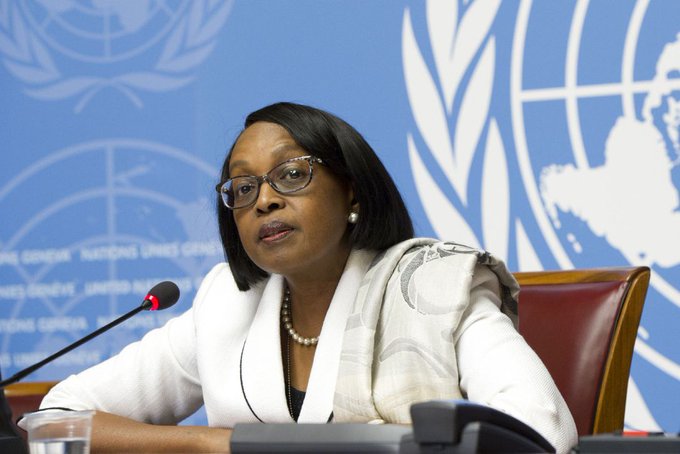|
Getting your Trinity Audio player ready...
|
African health leaders are concerned about the world’s preparedness and response to pandemics, drawing from the lessons learned during the COVID-19 pandemic, ahead of the Seventy-seventh World Health Assembly (WHA77). The leaders outlined their expectations and desired outcomes for the upcoming meeting in a press briefing organized by Amref Health Africa in partnership with Africa CDC, the WHO Regional Office for Africa, and the Bill & Melinda Gates Foundation Africa Office.
WHA77, set to take place from 27 May to 1 June, will serve as a platform to advocate for global action on urgent health issues, including climate change, infectious diseases, health equity, and access to healthcare, among other unprecedented public health challenges in Africa.
Dr. Matshidiso Moeti, World Health Organization (WHO) Regional Director for Africa, emphasized the importance of discussing the outcome of the Working Group on amendments to the International Health Regulations (2005) and the progress made by the Intergovernmental Negotiating Body (INB) in drafting and negotiating a WHO convention or agreement on pandemic prevention, preparedness, and response.
“We have been working closely with the Africa CDC and other partners, supporting the global discussions and negotiations to ensure that our Member States in the African Region are fully engaged in the Working Group and INB negotiations,” said Dr. Moeti. “We want to make sure that our region’s context and specific needs are taken into account.”
The World Health Assembly will also address other key areas of concern, including the progress and challenges of Universal Health Coverage (UHC), the escalating silent epidemic of non-communicable diseases, maternal health, and child mortality.
Dr. Moeti said the WHO will engage in discussions aimed at accelerating progress towards reducing maternal and child health issues. Notably, between 2000 and 2020, maternal mortality dropped by about 44% in the WHO African Region.
One of the WHO’s key areas of focus is assisting countries in building their capacity to manufacture essential health products locally. Progress has been made in this regard, with WHO providing technical support and expertise to countries across the continent.
“Sustainable local production requires a multidimensional, coordinated, and collaborative approach,” stated Dr. Moeti. “To this end, WHO continues to identify opportunities and agree on concrete interventions to support local African manufacturers.”
Dr. Githinji Gitahi, the Group CEO of Amref Health Africa, acknowledged that Africa’s health agenda cannot be discussed without the active involvement of the Africa CDC and the World Health WHO.
“Access to quality health services remains a significant concern across Africa, exacerbated by the climate crisis. The region is experiencing the adverse effects of climate change, impacting the urgency of achieving Universal Health Coverage (UHC),” said Dr. Githinji.
He highlighted that Kenya has been particularly hard-hit by the climate crisis, with devastating floods causing loss of life and displacing thousands, including pregnant women, which is a direct consequence of the climate change crisis.
“It is imperative that the challenges facing Africa are recognized and addressed collectively,” he added. “Over 930 million people – about 12 per cent of the world’s population – spend at least 10 per cent of their household budget to pay for health care. With the poorest people largely uninsured, health shocks and stresses already currently push around 100 million people into poverty every year, with the impacts of climate change worsening this trend. It’s our collective responsibility to support and protect the vulnerable, ensuring equitable access to healthcare for all.”
In light of these challenges, Githinji announced that the Africa Health Agenda International Conference (AHAIC) 2025 will take place from March 2-5, 2025 in Kigali, Rwanda. This conference will provide a platform for stakeholders to continue discussions on Africa’s health issues and collaborate on finding sustainable solutions.
“As Africa CDC, we are attending this year’s assembly with the expectation that discussions will focus on Africa’s public health priorities, as articulated in the new public health order towards our vision of a safer and prosperous Africa,” said Dr. Ngashi Ngongo, Chief of Staff and Head of the Executive Office at Africa CDC, who represented H.E. Dr. Jean Kaseya, the Director General of Africa CDC.
“These priorities include Universal Health Coverage, global health security, and addressing recurrent vaccine-preventable disease outbreaks such as cholera, measles, diphtheria, polio, and yellow fever,” said Dr. Ngongo.
Emerging and reemerging diseases such as Mpox, the burden of endemic diseases such as malaria, HIV, and TB, antimicrobial resistance, non-communicable diseases, and high child and maternal mortality rates continue to pose severe health challenges on the continent, he said.
These challenges are compounded by weak health systems, insecurity, and other social determinants of health such as climate change and food insecurity. Last year alone, Africa registered 166 public health events and outbreaks, averaging three events per week, which is overwhelming for the current health systems, said Dr. Ngongo.
Africa CDC’s second strategic plan seeks to improve surveillance, emergency response, and prevent infectious diseases on the continent. “The strategy provides a clear roadmap for the Africa CDC to deliver on its key mandate to provide timely, actionable, and continent-wide surveillance and disease intelligence data; rapid deployment of coordination and technical expertise to respond to outbreaks; health diplomacy; and seamless, well-coordinated regional laboratory and surveillance networks across countries,” said Dr. Ngongo.
The WHA77 presents a critical opportunity for African leaders and global health stakeholders to address Africa’s pressing health challenges. Through collaborative efforts and strategic discussions, the leaders can drive meaningful progress towards achieving health equity, strengthening health systems, and building resilience against future pandemics. The commitments and actions taken at WHA77 will be pivotal in shaping a healthier, more prosperous future for Africa. As we move forward, the continued partnership and dedication of organizations like WHO, Africa CDC, Amref Health Africa, the Bill & Melinda Gates Foundation, and other partners will be essential in realizing these goals and ensuring that no one is left behind in the quest for a healthier Africa.






